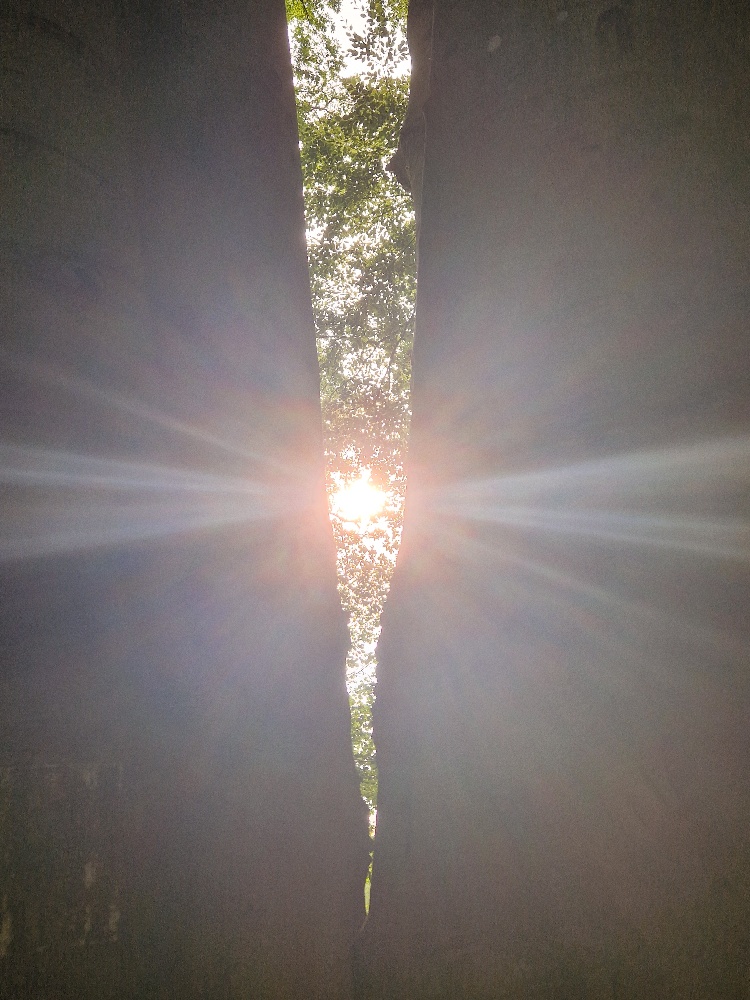The moral quest has never kept us moral. It has just kept us from each other. Maybe we should abandon the moral quest since its an old-world map and embrace instead the journey to wholeness, flourishing, love, and defiant joy….
Fr.Greg Boyle S.J., Homeboy Industries
Yet I have said over and over again that there is no “right” or “wrong” in the universe. A thing is not intrinsically right or wrong. A thing simply is.
Neale Donald Walsch, The Complete Conversations with God
We made a fearless and thorough moral inventory of ourselves.
AA Twelve Steps: Step Four
Morality has played a central role in my life. In the Catholic ideology of my Irish upbringing everything was broken down into one of two categories: Good or evil, God or the devil, heaven or hell, light or darkness, good or bad.
The Ten Commandments lay out how we should behave to “earn” the approval of God and therefore our place in heaven. While this did frighten me as a child, it struck me also as somehow false. My childhood was spent looking over my shoulder in this hybrid state of fear and scepticism.
Thou shalt not….
Decades later I came across „Conversations with God“ by Neale Donald Walsh. What struck me most was his idea about how much better it would be not to steal, for example, not because it was forbidden, but because such an act would not be aligned with our inner values, with who we really are. That deserves more attention, was my initial thought at the time.
Then, some time later, came the Taoist parable often associated with Eckhart Tolle’s teachings, entitled „The Farmer Who Lost His Horse“.
As Tolle relates it, the farmer lives in a rural mountainous area where not very much happens, in terms of drama. The village folks spend their days working in the fields, living in harmony with the cycle of the seasons, producing what was needed to support the close-knit community, growing and processing crops so that food would be available throughout the entire year, raising their children, and supporting each other in the little ways that matter most.
One day the farmer decides to enter his stallion into the competition at the annual fair in the nearest market town. Though he held his stallion in high esteem, he was genuinely surprised when it won first prize. Such a success had never been recorded in this village in living memory.
That evening, back in the village, all the neighbours came by to congratulate the farmer. How wonderful, they exclaimed, what a great stroke of fortune, they said.
The farmer maintained his usual equanimity, a smile beaming through his eyes, and said calmly: “Who knows what is good and what is bad?”
A few days later, the news of this great accomplishment having spread throughout the region, some thieves came in the dark of night and stole the stallion, probably assuming that it would now fetch a hefty price on the black market.
Word spread fast around the village. The neighbours came by to commiserate, saying how awful that whole affair had become. “Who knows what is good and what is bad”, responded the farmer once more.
A few weeks went by. Things returned to normal in the village. Then one afternoon the stolen stallion came galloping over the hill, headed for home. He was not alone, however, but was accompanied by several fine mares. He had apparently broken out of captivity and the mares had elected to join him.
The villagers were elated. Now the farmer had not only recovered his fine stallion, but he would also be further enriched by the ownership of three fine mares, who, once having borne offspring, would bring great wealth to the farmer’s family.
“Who knows what is good and what is bad? ”, asked the farmer once again.
In the following weeks, his young adult son was making good headway in breaking in the wild mares when, in a moment of distraction, he was thrown to the ground by the strongest of the three. The doctor was called, after an initial examination, announced that the boy’s leg had been broken in two places, and put it in a splint. Recovery would take at least ten weeks, he said, if the boy rested fully, as advised.
When the neighbours came to commiserate, they already knew the response that would come from the farmer. “Who knows what is good and what is bad?”
A month later, a battalion of soldiers rode through the village, rounding up all the healthy young men for army service, so that an invasion in the west could be repelled. Almost every house was left pining for one or more young sons. Only the farmer’s family remained unaffected, since their son was still recovering from the broken leg…
“Who knows what is good and what is bad?”
The story could be continued ad infinitum. The point is that we often find ourselves in situations we adjudge to be good or bad, only later to revise our assessment in the light of changing circumstances.
I have experienced this more than once in my life. Standing in the rubble of my dreams when relationships broke down, having been fired from jobs that promised great rewards of status and financial security, or lying on my back for weeks after a serious accident. In each case, the blessings became apparent, sooner or later. I was forced to revise my initial awfulising.
“Good” and “bad” are the labels we attach to certain experiences or situations. They are not innate characteristics of human behaviour or natural phenomena.
To what degree has morality fostered the evolution of humanity?
Fr. Greg Boyle S.J. is the founder and director of Homeboy Industries, the world’s largest gang intervention and rehabilitation program, and former pastor of Dolores Mission Church in L.A. Many of those who benefit from the services of Homeboy Industries are living, like me, in long-term addiction recovery.
As Fr. Greg, or “Gee”, as the hommies like to call him, points out in his most recent book “Cherished Belonging”, morality has not succeeded in making us moral and has, in fact, been the means by which division has been sown among us. We are good and they are bad. Perpetrators belong in prison and victims deserve our pity. When we punish all the bad guys the rest of us will be able to live in peace. Morality sows the seeds of division where only kinship can bring about the healing we yearn and need (my paraphrase).
My second, third, and fourth decades were characterised by substance addiction which began with my discovery of alcohol and weed in my mid teens. The effect was immediate. For the first time, I felt free, uninhibited, confident, and filled with a sense of belonging that had eluded me up until then.
Rather than being a problem, the engagement in active addiction was initially a solution, immediate and effective. No wonder I wanted more. Like all addicts, I discovered that more did not produce proportionally more of the desired effect.
So, I always needed more. In fact, those early experiences of euphoria were never again achieved. Addiction became a slog, just trying to achieve that high to keep my feelings at bay. Emotional self medication at play.
Filled with disillusion, fatigue, shame, and resentment, by the time I hit bottom at 42, I was the only good guy left. The source of my misery was to be found in the people, places, and things that surrounded me. Then something very uncharacteristic happened. I found the courage to ask for help.
Addiction skews our perception and produces deep loneliness. Cut off from self, humanity, and even life itself, we are in dire danger of withering on the vine, unless we can find a way into abstinence, recovery, healing, and growth.
In Twelve Step recovery we have the Twelve Steps which prevent us from killing ourselves, Twelve Traditions (guidelines for engagement in the fellowship), to prevent us from killing each other, and the so-called three legacies of Recovery, Unity, and Service. Used in combination, these elements have helped millions of alcoholics and other addicts recover since the inception of AA ninety years ago, in 1935.
The programme is laid out in a text book known as the “Big Book”, which was written by the first group who achieved stable abstinence in the late 1930’s.
They were the product of their time. Morality also played a major role in their world view. This can be found in the language used, referring to our character defects, righting our wrongs, and suggesting we make a fearless and thorough moral inventory of ourselves.
While I understand what was meant at the time, we can begin to look at things in a new light based on the insights have become available to us in the intervening ninety years.
The Big Book accurately states that: “Alcohol was but a symptom”. In the meantime, we have discovered the link between addiction and the woundedness of our early years (variously labelled as Developmental or Relational Trauma or Complex PTSD). My experience is that I developed, in those initial years, a sense of “unbearability of being” and began to search for external solutions to make life bearable. They were not that difficult to find.
Recovery is a wonderful, shared journey. Since we addicts are not saints, pockets of our fellowships often become infused with fear, which takes us in the opposite direction of recovery. “A miracle is a shift from fear to love”, says Marianne Williamson in her commentary on A Course in Miracles.
Recovery is wonderful example of a miracle.
This brings me to the role of morality when it comes to unity, one of the three legacies of AA and all subsequent fellowships. How can unity be maintained and cultivated while we still adhere to the old map of morality which underscores separation? Morality, seen through this lens, is a form of violence. The answer is, it can’t.
“Recovery beyond morality” is what is emerging today. In my view, this is a most welcome development. Instead of asking if something, someone, or some action is good or bad, we could ask if it is beneficial or detrimental to our healing and growth. With this shift, we avoid the trap of separating ourselves into discrete categories of good guys and bad guys.
Gandhi gifted the world the philosophy of “Satyagraha” – “insistence on truth” or “holding firmly to truth”. Satyagraha is rooted in the belief that truth (“satya”) is a powerful force that can be used to overcome injustice.
It emphasises non-violence (“ahimsa”) and the willingness to endure suffering to achieve one’s goals. More than mere passive resistance, Satyagraha, as practised by Gandhi and his followers, is an active, determined, non-violent pursuit of truth and justice, seeking to convert the oppressor through self-suffering and modelling the changes we wish to achieve in the world.
In the case of recovery from addiction, we ourselves have become the oppressor of our true selves. What Gandhi developed to achieve truth and justice on a societal level can be equally applied in the realm of recovery from addiction.
We recognise that we are all kin, children of the Great Spirit, who are constantly moving back and forth on a continuum from beneficial to detrimental to healing, growth and the evolution of humanity. There are no good or bad people, only constructive and destructive behaviours, thoughts, and feelings.
Those who engage in destructive behaviours do so because they lack awareness and consciousness. In this respect they are sick and deserving of our healing attention. The practice of Ubuntu in Southern Africa is a wonderful example of this approach.
In this kinship, this fellowship, we can encourage and assist each other as brothers and sisters on an equal footing, on the path of healing that beckons all of us, addicts or otherwise.
As Neale Donald Walsch eloquently stated in The Complete Conversations with God: “The central question in any decision is, “What would love do now?” Love for yourself, and love for all others who are affected or involved. If you love another, you will not do anything that you believe could or would hurt that person. If there is any question or doubt, you will wait until you can get to clarity on the matter.”
Recovery beyond morality is an important step towards unfolding our full potential of love and compassion in the service of the welfare of our beautiful planet and the concomitant survival of our species.






